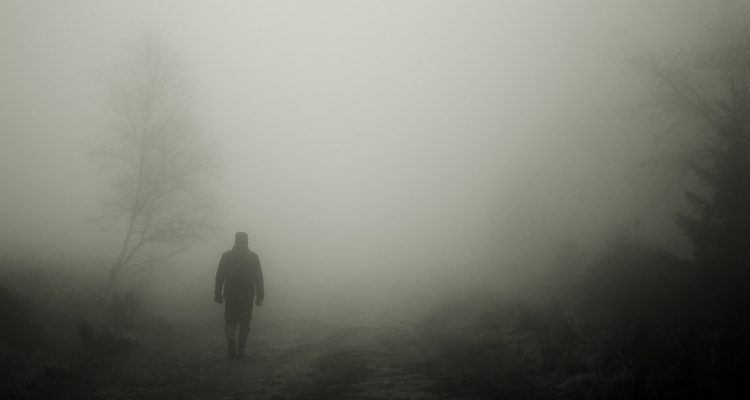As I pull my car through the sharp, blind turn on this empty winding road, I am met by a wall of fog. I’ve never eaten pea soup, but I imagine this particular fog is the inspiration for the common cliché. Covering the brake, I strain to see through the thick cloud that has descended around me. It’s difficult enough to see in the near dark of dawn, but the sheets of fog falling around me add to the eeriness of this lonely country road. I maneuver around another turn, and I am confronted by the airy silhouette of a fog-draped figure. As I creep down the narrow straightaway, drawing nearer to the figure—the only other living thing on this dawn-darkened desolate road—I can make out that it is a flannel-shirted man. He appears to wield two long unidentifiable implements, one in each hand. A pitchfork? A scythe? An axe? A shovel for burying victims? My mind races around the possibilities.
Ok, so I exaggerate. Perhaps I’ve seen too many movies. Lest I lead you to believe that this is yet another stereotypical West Virginia horror story with a banjo-laden soundtrack, allow me to set the scene more properly. It’s around 7:40 on a November Wednesday morning. The late-fall fog that is a standard part of the Ohio Valley backdrop has descended on my morning commute to West Liberty. It’s true that I am on a relatively narrow and winding road—it happens to be the bottom portion of Greggsville, Clinton and Potomac Road (better known as GC&P). And I do see a figure emerge from the fog, but I’m not the least bit surprised by his presence there. In fact, he’s there every couple of days, there on the shoulder of GC&P Road. He is wearing a flannel jacket, a cigar dangling from the corner of his lips, and he is indeed holding two long implements — a broom and a dustpan.
You see, I drive up GC&P Road every morning, typically between 7:30 and 8 a.m., and every couple of days I see the same man—same flannel jacket, same cigar, same broom and dustpan. I do not know the man; I’ve never stopped to ask his name. I do not know what he does for a living or what he may have done before possibly retiring. All I know is that I see him every few days—always at a different location along the bottom of GC&P—sweeping up the past few days’ littered cigarette butts and soda bottles.
So, my imagination does run wild; only I’m not really imagining a West Virginia horror story. Instead I imagine that he is a resident in the stretch of houses lining the bottom of GC&P. I imagine this is his street. And I imagine he feels such ownership of this street that he spends every couple of mornings making sure his street is clean and litter free. I don’t suspect that he is an employee of the city who has been hired for street cleaning; I’ve seen him in a driveway, on private property, a time or two. Once or twice, I’ve seen him chatting with a neighbor about to begin her own morning commute.
No, this is not a city employee; this is simply a man who takes such pride in his place of residence that he willingly donates his mornings cleaning up other people’s messes. He attempts to keep clean that which is sullied by mindless passers-through. And as a daily passer-through myself, it may be true that I spend only minutes there, but I can’t help but appreciate his voluntary service and his efforts to stand up and take responsibility for the spaces around him, even in the face of the near-constant mindlessness of those passing through his place. I admire his pride in his place. It is that pride that makes his place his, that makes his place great. Only in Wheeling are residents so full of pride and a sense of place that they voluntarily care for public spaces . . . and that’s why I live here.




